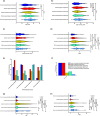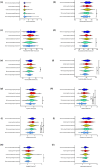Identifying neuropsychological phenotypes in multiple sclerosis using latent profile analysis
- PMID: 40312892
- PMCID: PMC12046067
- DOI: 10.1111/ene.70009
Identifying neuropsychological phenotypes in multiple sclerosis using latent profile analysis
Abstract
Background: People with Multiple Sclerosis (MS) frequently experience cognitive impairment and neurobehavioral issues including depression and fatigue. We aim to define neuropsychological phenotypes in MS based on cognitive function, depression and fatigue.
Methods: In this cross-sectional study, we collected clinical and neuropsychological data for 600 MS patients. Neuropsychological assessments included Brief International Cognitive Assessment for MS (BICAMS), Beck Depression Inventory (BDI-II) and Modified Fatigue Impact Scale (MFIS). We employed a latent profile analysis (LPA) to unveil latent neuropsychological profiles in MS patients, clustering individuals in unobserved groups, and we compared clinical and MRI features between groups.
Results: LPA identified five neuropsychological phenotypes: Normal neuropsychological phenotype, with normal cognitive and neurobehavioral scores; Isolated cognitive impairment, showing mild reduction in BICAMS scores; Isolated neurobehavioral impairment, showing increased BDI-II and MFIS scores; Mild neuropsychological impairment, showing mildly reduced BICAMS scores, and mildly increased BDI-II and MFIS scores; Severe neuropsychological impairment, showing severely reduced BICAMS scores, and great increase in BDI-II and MFIS scores vs patients with normal neuropsychological phenotype. Relapsing-onset and paediatric-onset patients are more likely in the normal neuropsychological phenotype and isolated cognitive impairment class. Patients with severe neuropsychological impairment showed lower cortical grey matter, thalamic, amygdala, pallidum and putamen volume compared with those with isolated neurobehavioral impairment.
Conclusions: We identified five neuropsychological phenotypes in patients with MS that showed distinct clinical and radiologic features, as from different stages of the disease pathology accrual. Clinical and MRI features may help distinguishing patients requiring closer monitoring of cognitive or neurobehavioral symptoms.
Disclosures: Antonio Luca Spiezia, Fabrizia Falco, Federica Lamagna, Martina Eliano, Valerio Nicolella, Antonio Esposito and Cristina Di Monaco have nothing to disclose. Marcello Moccia has received financial support by the MUR PNRR Extended Partnership (MNESYS no. PE00000006, and DHEAL-COM no. PNC-E3-2022-23,683,267); research grants from the ECTRIMS-MAGNIMS, the UK MS Society, and Merck; salary as Assistant Editor of Neurology; and honoraria from Abbvie, Biogen, BMS Celgene, Ipsen, Jansenn, Merck, Novartis, Roche, and Sanofi-Genzyme. Sirio Cocozza has served on scientific advisory board for Amicus Therapeutics, has received speaker honoraria from Sanofi and research grants from Fondazione Italiana Sclerosi Multipla and Telethon. Giuseppe Pontillo was supported by the MAGNIMS/ECTRIMS (2020), ESNR (2021), and ECTRIMS (2022) research fellowship programs. Roberta Lanzillo has received honoraria from Biogen, Merck, Novartis, Roche and Teva. VBM has received research grants from the Italian MS Society, and Roche, and honoraria from Bayer, Biogen, Merck, Mylan, Novartis, Roche, Sanofi- Genzyme and Teva. Vincenzo Brescia Morra has received research grants from Italian MS Federation and Roche; and honoraria from Almirall, Biogen, BMS Celgene, Janssen, Merck, Novartis, Roche, Sanofi-Genzyme, and Viatris. Maria Petracca discloses travel/meeting expenses from Novartis, Janssen, Roche and Merck; speaking honoraria from HEALTH&LIFE S.r.l., AIM Education S.r.l., Biogen, Novartis and FARECOMUNICAZIONE E20; honoraria for consulting services and advisory board participation from Biogen; research grants from Baroni Foundation and the Italian Ministry of University and Research. Antonio Carotenuto disclosed research grants from ECTRIMS-MAGNIMS and Almirall, travel/meeting expenses from Novartis, Janssen, Roche and Merck and speaking honoraria from Merk, BMS, Biogen, Novartis, Roche and Almirall.
Keywords: cognitive impairment; latent profile analysis; multiple sclerosis; psychiatry.
© 2025 The Author(s). European Journal of Neurology published by John Wiley & Sons Ltd on behalf of European Academy of Neurology.
Figures


References
MeSH terms
LinkOut - more resources
Full Text Sources
Medical
Miscellaneous

